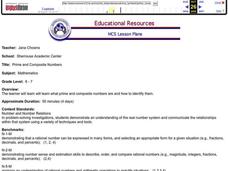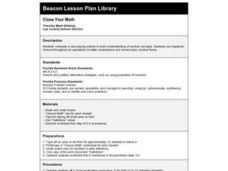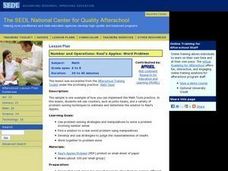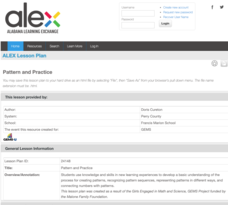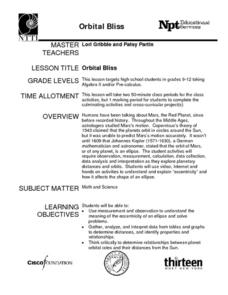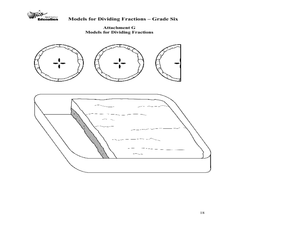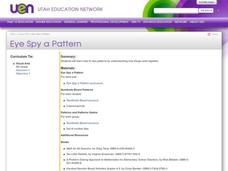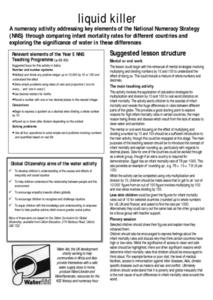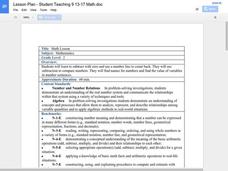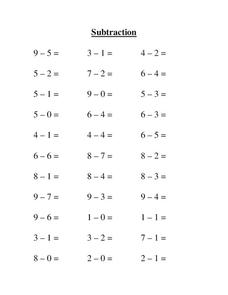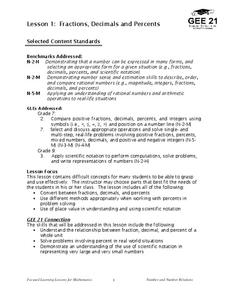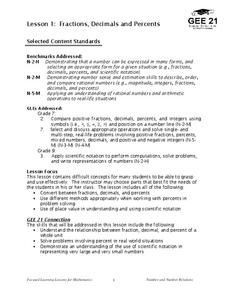Curated OER
Prime and Composite Numbers
Prime and composite numbers are the focus of this mathematics instructional activity. In it, learners practice techniques for identifying these two types of numbers. They utilize the Inspiration program to complete a task that is clearly...
Curated OER
Close Your Math
Fourth graders complete a role playing activity to build understanding of number concepts. They use Algebraic Closure throughout six operations to better comprehend and review basic number theory. They utilize a worksheet imbedded in...
Curated OER
Introduction to Exponents
Problem solve using exponents. Pupils read One Grain of Rice: A Mathematical Folktale and write powers to represent amounts from the story.They compare actual solutions to their predictions and play a game to practice using...
Curated OER
Interactivate: Introduction to Functions
This interactive website provides a variety of lesson plans according to which standards you are applying and which textbook you use. Introduce functions to your class by having them construct single operation machines and create...
Curated OER
Developing Strategies for Addition and Subtraction
Primary graders develop strategies to assist them with addition and subtraction. They discover number combinations and numerical facts which enable them to add and subtract more effectively. Students use these techniques to complete...
Curated OER
Is That Your Final Answer?
This unit on integers includes a pre-test, a post-test, four spreadsheets, and links to an interactive web-site to support the learning of integer operations. Access to computers and the Internet are imperative to this unit. The lessons...
Curated OER
Number and Operations- Raul's Apples: Word Problem
Students discover how they can use manipulatives to solve word problems. In this problem solving instructional activity, students read Raul's Apples Problem and then complete a worksheet, using beans or counters to solve the problem....
Alabama Learning Exchange
Pattern and Practice
Young scholars learn how to make patterns. Students first display their prior knowledge of patterns before delving into the lesson. They complete a worksheet and participate in a web-based class activity. They work in cooperative groups...
Curated OER
Orbital Bliss
Most young mathematicians are aware that the planets don’t orbit the sun in a circle but rather as an ellipse, but have never studied this interesting feature. This resource looks at the planetary orbits in more detail and helps learners...
Ohio Department of Education
Models for Dividing Fractions - Grade Six
Fifth and sixth graders use food and candy to help them represent division of fractions and develop algorithms to solve fraction problems. They discuss dividing whole numbers by fractions. Pupils use sticks and chocolate bars to...
Curated OER
Fraction Models
Third graders make models of fractions and mixed numbers. Using fraction strips and drawing pictures, 3rd graders develop conceptual understanding of the equivalent forms. Students use the number line to represent and compare...
Curated OER
Eye Spy a Pattern
Fifth graders examine how to see patterns by showing how things work together. They identify, analyze and determine a rule for predicting and extending numberical patterns involving operations of whole numbers, decimals and fractions.
Curated OER
Liquid Killer
Students explore number sense applications and discuss strategies for multiplication and division using mental math. For cross-curricular purposes, they explore causes and effects of inequality and social injustice. Students explore...
Curated OER
Which Bag is Which?
Young scholars explore number sense by completing a statistical analysis game in class. For this data graphing lesson, students utilize visual references such as colored cubes and tiles to map out the results of an experiment outcome...
Curated OER
Oral Language in Mathematics
Third graders examine fractions by descriptively writing about them. In this number sense lesson, 3rd graders read number sentences and compare fractions based on their size. Students explain fractions to a friend by writing a friendly...
Kenan Fellows
Saving Those Who Save Us: Exploring the Use of Sensors with Data Visualization
Sensor technology is amazingly accurate and useful. Combining the sensor technology and mathematical knowledge, scholars design experiments to answer a question they have developed. Questions may focus on light sensing, temperature...
NOAA
Ground-truthing Satellite Imagery with Drifting Buoy Data
Ground-truthing ... is it even a word? The last installment of a five-part series analyzes how scientists collect sea surface temperature data. Scholars use government websites to compare temperature data collected directly from buoys...
NOAA
Journey to the Unknown
What's it like to be a deep-sea explorer? Tap into the imaginations of your fifth and sixth graders with a vivid instructional activity, the second part of a six-part adventure. Learners close their eyes and submerge themselves in an...
Mathematics Assessment Project
Building and Solving Linear Equations
Young scholars write and solve linear equations in one variable based on descriptions of the operations that are applied to the unknown variable in an algebra machine. They then create their own problems for classmates to solve.
Curated OER
Number Line Math
Second graders use a number line to practice subtraction. For this subtraction lesson, 2nd graders use a number line to count backwards. Students participate in mad math activities and solve problems.
Curated OER
Basic Subtraction
In this elementary math worksheet, 3rd graders perform mental math and transfer the answers to the worksheet. This is ideal for the development of number sense.
Curated OER
Group Foraging
Students explore co-operation by researching ocean life. In this fish science lesson, students identify many vocabulary terms associated with oceanography and discuss what group foraging means among fish. Students utilize paints and...
Curated OER
Fractions, Decimals and Percents
Students investigate the differences when using decimals, fractions, and percents. They focus on the process of using them in real problems and how to convert them from one form to another.
Louisiana Department of Education
Fractions, Decimals, and Percents
Fractions, decimals, and percents all say the same thing! Show your classes how to convert between the three forms using visual and numeric representations. Then lead them to an understanding of scientific notation.
